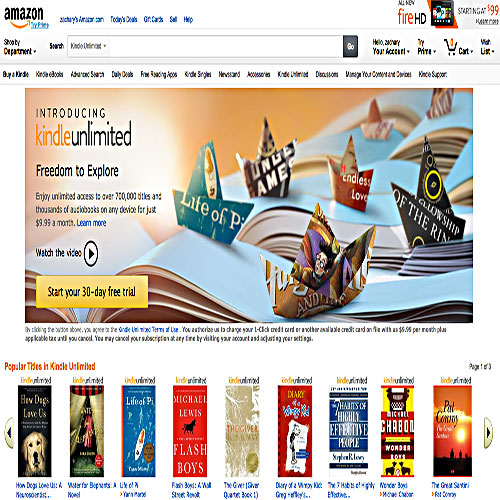This post is a continuation of an earlier discussion concerning recent developments in subscription reading services.
Big publishing continues experimenting with the subscription reading services Oyster and Scribd: 15,000 Harlequin romance titles became available through Scribd just last week. Sustaining this success is contingent on a host of delicately balanced circumstances, detailed in my last post. The recent addition of a variable entrant in the recurring revenue market has disrupted the success potential for all players while simultaneously leveraging the stakes. What would a discussion of current affairs in publishing be without mentioning Amazon? In July, the book giant released Kindle Unlimited to the world for $9.99 a month, claiming a selection of over 600,000 ebooks and 7,000 audiobooks for subscribers. That number is more than either Oyster or Scribd can currently offer their readers. But that comes as no surprise. Given the gargantuan size of Amazon, I’m surprised the figure is not larger. Here are some things the discerning and prospective reader should know.
If you have been following the Amazon-Hachette fracas, it will probably come as no surprise that none of the Big Five have made any of their books available through KU. This is not to say there are no big books for readers to enjoy—in a cursory glance through the KU catalog, I spotted Harry Potter, Mocking Jay, Life of Pi, and Michael Chabon’s Wonder Boys. But, if you want to read Stephen King’s 2012 novel A Face in the Crowd (and really, why would you not when you’re paying $10 a month to gorge yourself on UNLIMITED content?), I’m sorry to say you will be sorely disappointed. You can, however, read that book (along with thousands of other recent titles from Simon & Schuster and HarperCollins) through both the Oyster and Scribd applications.
“If I can’t read any titles from Big Pub,” you might ask, “what value is the Kindle Unlimited service adding to the market?” At the moment, audiobooks are a new addition to subscription “reading.” Since Amazon owns Audible.com, it’s in a unique position to expand their service in this way. However, this will probably not look very enticing since Audible.com offers over 150,000 titles from all major publishers for five more bucks a month ($14.95/mo). So, loyal audiobook consumers are likely to go that route. To be fair, Amazon is offering a free three-month trial of Audible with a subscription to KU; so, if they are lucky, they might get you to eventually pay for both KU and Audible.com—that’s $24.94 a month! Who consumes that much content? Audiobooks are, in their own right, contentious entries in the publishing matrix; Cory Doctorow recently speculated that they will play a decisive role in the next DRM battle. But we’ll have to address that hornet’s nest when and if we get there.
At this juncture nothing is clear, and the future remains a contentious battleground. There is strong evidence that consumers prefer subscription models; the expectation that all content can be cheaply or freely accessed through a single platform doesn’t seem to be going away anytime soon. Publishers and distributors will continue to struggle to satisfy this consumer demand. Whether this model is suitable and sustainable for general trade books remains to be seen. Next time, I’ll discuss possible ways subscription reading can survive in the publishing landscape.

